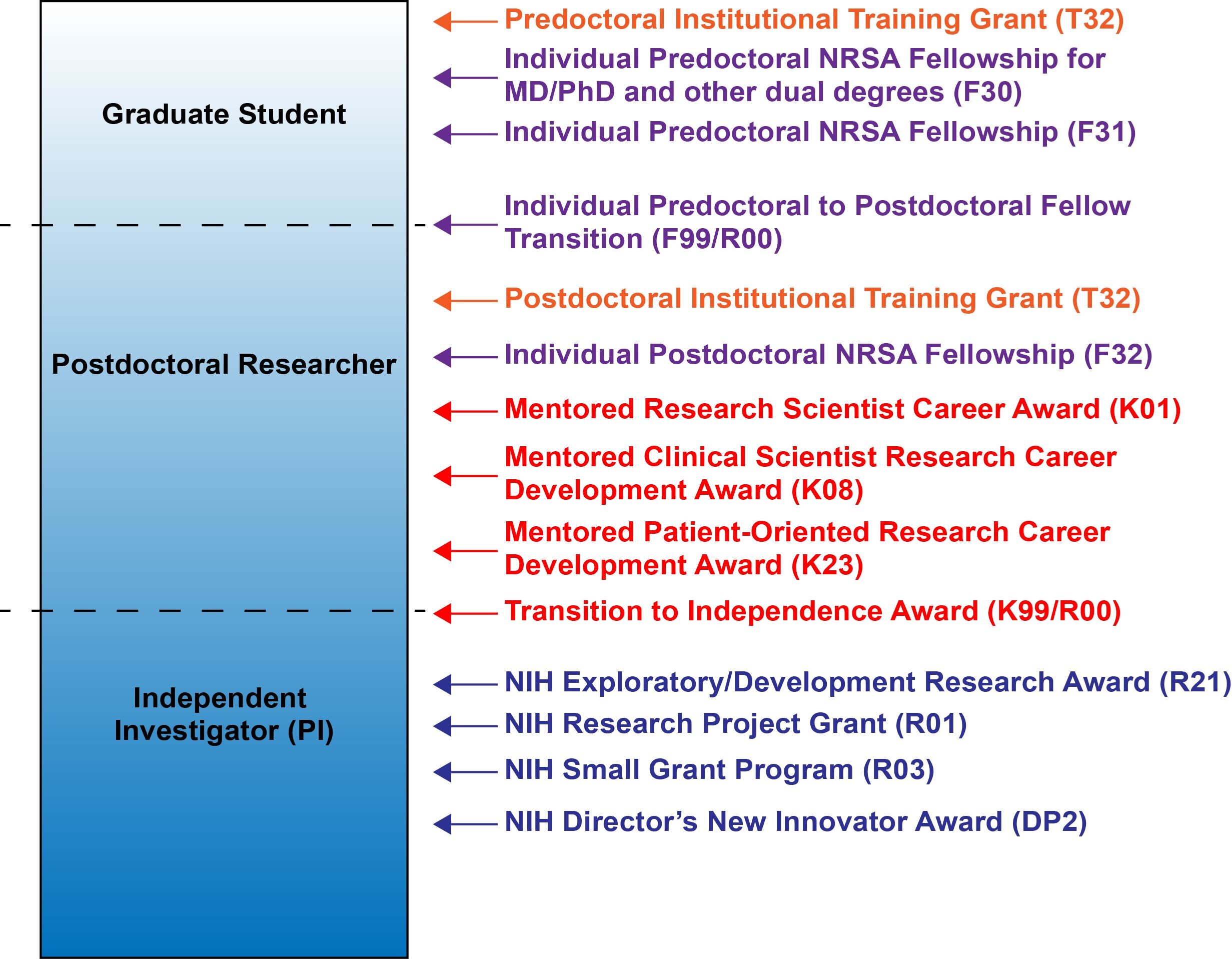NIH Grants:
Chapter 02 — Choosing a NIH fellowship or grant that is right for you
Choosing a NIH fellowship or grant that is right for you
Good news! There are a lot of NIH fellowships and grants out there for scientists at almost all stages of their career. Navigating the NIH website can be difficult, but not impossible. Let’s take a look at the basics.
Introduction to f-awards and k-awards
There are only two main groups of fellowships or career development awards that predocs and postdocs apply to: F-awards and K-awards.
A very brief description of F-awards (fellowships), K-awards (Career Development), and R-awards provided by the NIH Research Training and Career Development Website.
F-Awards: Ruth L. Kirschstein National Research Service Award (NRSA) for Individual Fellows. Most MD/PhDs apply for the F30, predocs apply for the F31, and postdocs apply for the F32. However, there are other very interesting F-awards out there, like the F99, a predoc to postdoc transition award that is only offered by a few institutes.
K-Awards: Research Career Development Awards
More or less these awards bridge the end of your postdoc and the beginning of your independent lab. As a result, these are considered transition awards. Most postdocs apply for either the Mentored Research Career Award (K01) or the Pathway to Independence Award (K99).
where do i find more details about a specific fellowship or grant?
Go to the NIH Research Training and and Career Development “Programs” page and then select on either “Fellowships” or “Career Development” — For the example below I chose Fellowships.
Then do a quick search for grants that you can apply for:
1. Select a role — I picked awardee
2. Select a career level — I selected “Graduate/Clinical Doctorate”
3. Click on “Apply Filter” and the list below should now be more specific to what you want
4. Read the short descriptions and once you find a fellowship you are interested in, click on “Details” to learn more
After you click on “Details” you will be taken to the main page of the fellowship or grant. Here you will find the following information:
1. A slightly more detailed description of the fellowship or grant
2. Eligibility
3. NIH Funding Opportunity Announcement — These links will take you to a detailed (and very long) description of the funding opportunity, including what institutes are participating, the application due dates, duration of support, etc. Sometimes you will be surprised by what you find here, as there may be a funding opportunity for something specific to your work… like a “Bioinformatics interdisciplinary predoctoral fellowship in diabetes, endocrinology, and metabolic diseases”
thoughts for postdocs contemplating a f32, k01, or k99
When I was applying for NIH grants as a postdoc, I really struggled to make a decision between a F32, K01, or K99. So, for those of you also contemplating this decision, here are my thoughts.
There are a few critical differences between a F32, K01, and K99 that are based on your citizenship status and the amount of time you have been a postdoc.
Citizenship status: To apply for a F32 and K01 you need to be either a US citizen or permanent resident. For the K99 you do not need to be a US citizen.
Time: The amount of time you have to apply for each grant is getting shorter and shorter. For some F32 grants, you need to apply very early in your postdoc.
A few more thoughts about the F32, K01, and K99:
NRSA for individual fellows (F32): Requires that you apply very early in your postdoc (sometimes within your first year as a postdoc). Little to no preliminary data required.
Mentored research career award (K01): Intended for more experienced postdocs with a solid research history. Preliminary data is typically required with a history of publications. Funding for 2-4 years (depending on when you receive the award). Need to be careful here because not all institutes support this award.
Pathway to independence award (K99): Intended for more experienced postdocs that are nearly at the end of postdoc, but want to have two more years of postdoctoral training before becoming a professor. Preliminary data required with a history of publications. Postdoctoral funding for only 2 years. Upon becoming an assistant professor you can request/apply for R00 independent phase funding, which is 3 years of additional funding for your own lab.




